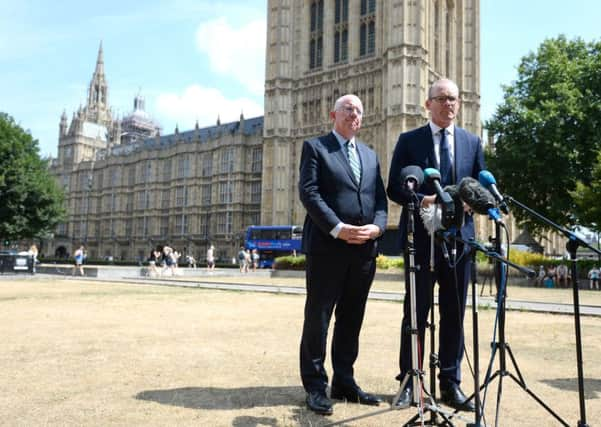Coveney disappoints SF, saying that British-Irish body can't replace Stormont


The BIIGC – a body created under the Belfast Agreement, but which had not met for 11 years as devolution functioned in Belfast – met at the Cabinet Office yesterday after pressure from nationalist parties for it to intervene in the running of Northern Ireland.
Amid an 18-month vacuum where civil servants have been in charge of Stormont’s budget of more than £10 billion without any ministerial oversight, Sinn Fein and the SDLP had presented the BIIGC as an alternative to direct rule whereby executive decisions could be taken.
Advertisement
Hide AdAdvertisement
Hide AdThe agreement precludes the BIIGC from dealing with devolved matters and such an approach would have led to unionist concern that the agreement was being abandoned.
However, in what represents something of a setback for Sinn Fein and the SDLP, Mr Coveney – who was joined at the meeting by Justice Minister Charlie Flanagan – made clear afterwards that its remit could not involve either devolved matters or executive decisions.
Mr Coveney said: “Can I say to unionists in Northern Ireland – or unionists anywhere – they have nothing to fear from a British-Irish Intergovernmental Conference.
“This is an agreed structure that both governments have signed up to as part of the Good Friday Agreement.
Advertisement
Hide AdAdvertisement
Hide Ad“It’s very clear that we do not deal in the British-Irish Intergovernmental Conference with devolved decision-making in Northern Ireland.
“This is about protecting the institutions of the Good Friday Agreement, trying to find a way that they can work and function – which they aren’t doing today.”
The joint communique issued after yesterday’s conference set out a fairly perfunctory list of items which were discussed, suggesting that the meeting had been largely a rebranding of the sort of Anglo-Irish governmental meetings which have been going on since the early 1970s.
It referred to a commitment to tackle terrorism, a desire to see Stormont restored, discussions about the legacy of the Troubles and wider security cooperation.
Advertisement
Hide AdAdvertisement
Hide AdThe communique also suggested an expanded role for the conference after Brexit, as something of a diplomatic bridge between the two governments.
However, in comments after the meeting both the British and Irish governments referred to issues having been discussed which are devolved matters.
David Lidington, Theresa May’s de facto deputy who chaired the meeting, said that the meeting discussed prisons and the Irish government said it discussed payments to victims of historic institutional abuse – two matters which are devolved to Stormont.
Mr Lidington said: “It is consultative, not executive, in format and it is there to talk about those matters that are not devolved to the Assembly and Executive of Northern Ireland.”
Advertisement
Hide AdAdvertisement
Hide AdChancellor Phillip Hammond, who was visiting Belfast, said that the BIIGC was part of the Belfast Agreement and it was “very important that we honour the commitments that we have made under those agreements”. He added: “East-west relations are just as important as north-south relations and just as central a part of the Belfast Agreement.”
Mr Coveney also said that the two governments hoped to “try some new initiatives” in the “early autumn” in a fresh attempt to persuade the DUP and Sinn Fein to return to Stormont.
Sinn Fein vice president Michelle O’Neill welcomed the meeting, saying: “Joint stewardship through the British-Irish Intergovernmental Conference amounts to an honest and responsible effort to protect and advance the full potential of the Good Friday Agreement framework.”
However, Ulster Unionist chief whip Steve Aiken dismissed that, saying that there was “no such thing as ‘joint stewardship through the British-Irish Intergovernmental Conference’”.
Advertisement
Hide AdAdvertisement
Hide AdHe added: “It flows from the Belfast Agreement which explicitly ensured that the constitutional position of Northern Ireland could only be changed if the people of Northern Ireland gave their consent. Sinn Fein can forget about joint stewardship, joint sovereignty or any other term they care to dream up, but they cannot change the fact that Northern Ireland is an integral part of the United Kingdom and that will not change.”